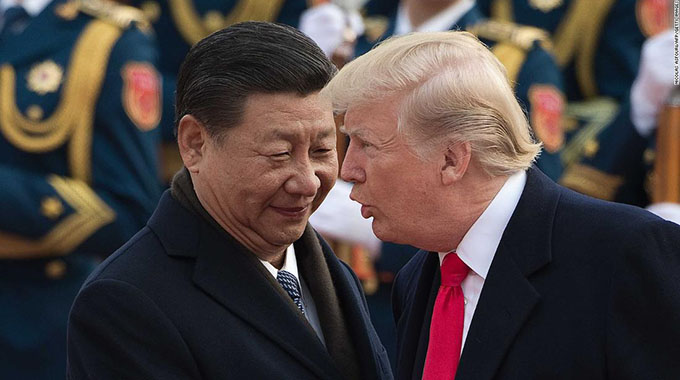‘Hard for Xi, Trump to make progress on trade’

BEIJING. — China’s President Xi Jinping and US President Donald Trump are likely to find it “difficult” to make major progress toward ending their countries’ trade war when they meet at a G20 summit in Japan in June, a former top Chinese official said on Friday.
The US approach to trade talks has been “bullying and America First”, whereas the principles of China’s approach to negotiations were equality and cooperation, said Dai Xianglong, who headed the People’s Bank of China from 1995-2002 and remains an influential figure in China.
“It’s hard to reconcile these,” Dai told a seminar on US-Sino trade relations, noting that trade friction between China and the United States was a long-term issue.
Trade tensions between Washington and Beijing escalated sharply this month after the Trump administration accused China of having reneged on its previous promises to make structural changes to its economic practices.
Washington later slapped additional tariffs of up to 25 percent on $200 billion of Chinese goods, prompting Beijing to hit back with additional levies on around $60 billion of US imports due to take effect on Saturday.
“I expect that at next month’s meeting of the leaders in Japan it will be difficult to achieve major progress,” Dai said, later adding that he was not confirming that the meeting would take place, but he hoped it would.
Trump has said he is planning on meeting Xi during the G20 summit, set for June 28-29 in Osaka, though China has not formally confirmed this. Dai said he did not rule out stronger retaliation by China.
He said heavy sales of US Treasuries by China was a less likely option for retaliation as it would hurt China’s own interests.
Since the latest round of US tariffs, which caught Beijing by surprise, Chinese state media has gone on the offensive.
The People’s Daily, the ruling Communist Party’s flagship newspaper, warned this week that China was ready to use its dominance of rare earth’s, crucial minerals used in electronics, to strike back in the trade war.
A deluge of sharply worded commentaries and warnings out of China in the last two weeks has intensified a public relations battle with the United States that could complicate the run-up to any Xi-Trump meeting in Japan.
Speaking at a separate briefing, Chinese Foreign Ministry spokesman Geng Shuang took umbrage at Trump comments on Thursday that China was becoming a “very weakened nation” due to companies leaving China because of the tariffs.
“This is neither the first nor second time the US side has said these lies,” Geng said. “But the US side seems to be very persistent, even obsessed with it, and is still repeating these lies.”
At the Beijing seminar on Friday, former Chinese vice commerce minister Wei Jianguo said initiating a trade war with China might be the biggest strategic mistake made by the United States since World War II or even its founding.
There is a need to prepare for the likelihood for the trade war to ratchet up tensions to geopolitical areas including the South China Sea, said Wei, adding that the trade conflict might last for 30 years or even half a century.
He suggested that China had many countermeasures it could take, including rare earths and against Boeing Co or US software.
“There are lots of Chinese countermeasures, and, speaking honestly, we hope not to use them, because we always negotiate with the United States with sincerity and hope to achieve results,” Wei said.
Dong Yang, a former executive director at the China Association of Automotive Manufacturers, said at the seminar that US auto parts suppliers could also be hit.
“US car components companies have presence in China, and set China as a global manufacturing base.
“The escalation of the trade war between China and the United States will seriously affect their development in China and the world,” Dong said.
Other parts suppliers such as Germany, Japan, South Korea and France can also provide strong substitutes for US components, he said.
All those who spoke at the seminar were former, albeit senior, officials. The government has not organised media appearances for top leaders or trade negotiators to answer questions on the trade talks.
Chinese officials rarely take questions from foreign media. — Reuters.









Comments